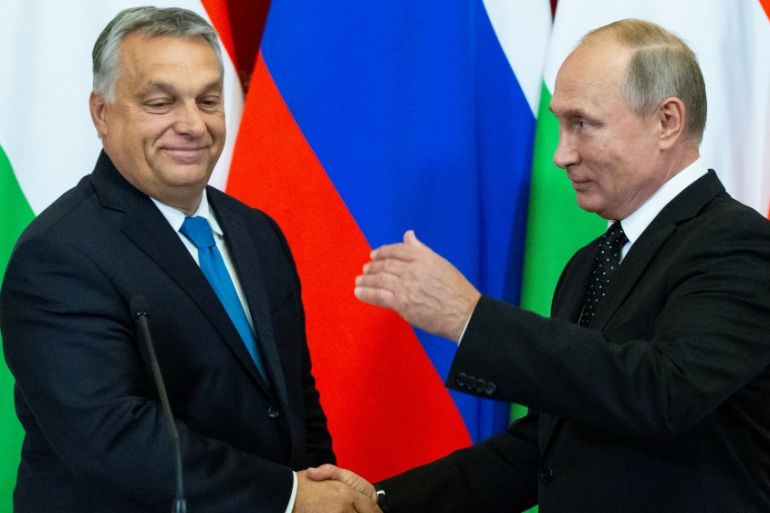Does Hungary’s relationship with Russia send a message to the EU?
Orban and Putin have announced expanded energy deals. Analysts say they’re economically and strategically important.

The leaders of Hungary and Russia have announced an increase in energy agreements – both gas and nuclear – in their first international meeting after controversies in both countries.
Hungarian Prime Minister Viktor Orban and Russian President Vladimir Putin said after a meeting on Tuesday that two Russian-built nuclear reactors would be installed in the Paks Nuclear Power Plant in central Hungary.
Keep reading
list of 4 itemsBombs and viruses: The shadowy history of Israel’s attacks on Iranian soil
Russia says Ukraine attack hits Zaporizhzhia nuclear power plant
Nuclear energy cannot lead the global energy transition
The announcement comes less than a week after the European Parliament voted for disciplinary action against Hungary citing its flouting of the EU’s democratic norms, and as Russia continues to be blamed for the poisoning of Sergei and Yulia Skripal in the UK.
Although Hungary “followed the British exampled and expelled one Russian diplomat [following the alleged poison attack],” Peter Kreko, the director of the Political Capital Institute, a Hungarian think-tank, told Al Jazeera, “I don’t think Skripal was on the agenda at the meeting”.
Orban is often said to have created the EU’s first “illiberal democracy” and has long touted Hungary’s close relationship with the Kremlin, often to the ire of the EU.
After Tuesday’s meeting, he said that he is “pleased that for years relations between the two countries have been balanced and steady”.
The energy deal “comes at a time when Hungary’s relationship not only with the EU, but also the US, are worse”, Kreko said.
Hungary’s difficult relationship with the EU
There are a few sticking points between the EU and Hungary.
A report detailing Hungary’s alleged breaches of democratic norms, which was used to justify European Parliament’s disciplinary action, cited violations including weakening media plurality, crackdowns on civil society and moves towards limiting educational freedom.
Hungarian Foreign Minister Peter Szijjarto slammed the vote as “nothing less than the petty revenge of pro-immigration politicians”.
Budapest’s Central European University, founded and funded by Hungarian-American billionaire George Soros, who is known for his support of liberal causes and refugees, has been under the threat of closure for almost two years.
But there are international issues, too.
The subject of Ukraine, from which Moscow militarily seized and annexed Crimea in 2014 in the wake of a revolution against a pro-Russia government in Kiev, is among Hungary’s differences with the bloc.
In June, it was the sole EU nation that voted against financial aid for Ukraine, which is still waging a war against Russia-supported separatists in the country’s east.
It has also been a vocal opponent of EU sanctions on Moscow for its actions in Ukraine.
“If there were no sanctions, we would be able to cooperate more and make greater advances,” Orban said in July.
Kreko said Hungary’s agreement with Russia to expand the Paks power plant, originally made in 2014, has motivated Budapest to side with Moscow on issues related to Ukraine.
Orban’s proximity to Putin, even in the face of controversy, does “send a message to the EU”, he said.
“He already told it once, that if the EU and US do not involve us more in the economic projects, ‘We will turn [East]’.”
Economic motivations
While Orban is often portrayed as a nationalist populist, many of his economic policies are neo-liberal and depend on international funds, Zoltan Pogatsa, a lecturer at the University of West Hungary who focuses on the economics of EU integration, said in an interview with Al Jazeera.
Pogatsa explained that Hungary has received between six and seven percent of its gross domestic product from the EU Cohesion Fund, which from 2014 to 2020 is meant for member states whose gross national income per inhabitant is less than 90 percent of the EU average so they can complete “priority projects of European interest”, according to the EU Commission’s website.
But Hungary is running out of these funds, Pogatsa said, and that doesn’t bode well for its economic future.
A strong economy accounts for some of Orban’s popularity.
Since Orban assumed office in 2010, Pogatsa said he “probably … can’t find a single economic figure in which Hungary doesn’t look better than it did 10 years ago. Inflation, growth, everything is better on paper”.
Hungary has averaged a healthy three percent GDP growth in the last five years.
“[But] in the longer term, a lot of this positive picture today isn’t sustainable. A lot of it has been dependent on EU transfers. In order to maintain that, Orban needs Russian or Chinese investment” until EU funds return in 2022, Pogatsa said.
With the money from the EU Cohesion fund drying up, “I think Paks is an economic necessity for GDP growth to continue”, he concluded.
Will the agreement be honoured?
At the meeting, Putin also called for expanding nuclear corporation.
The relationship “certainly plays into Orban’s hands. A sort of, ‘We can scare European leaders that we might be veering to the East’,” said Dimitar Bechev, a research fellow at the Atlantic Council, a nonpartisan US-based think-tank that focuses on international affairs.
But Bechev noted that Hungary isn’t the only EU leader courting Russian energy agreements.
Germany imported 35 percent of its natural gas from Russia in 2015, the last year for which numbers are available.
French energy company Total bought a 10 percent stake in a Russian Arctic gas project, in a deal that was struck during French President Emmanuel Macron’s visit to Moscow in May.
And just because Putin and Orban announced an agreement, “the small print” needs to be seen, Bechev said.
“Leaders give signatures in grand partnerships. It’s energy companies working out the small print,” he said. “The world is full of memorandums of understanding when it comes to large-scale energy agreements. Not as many get completed.”